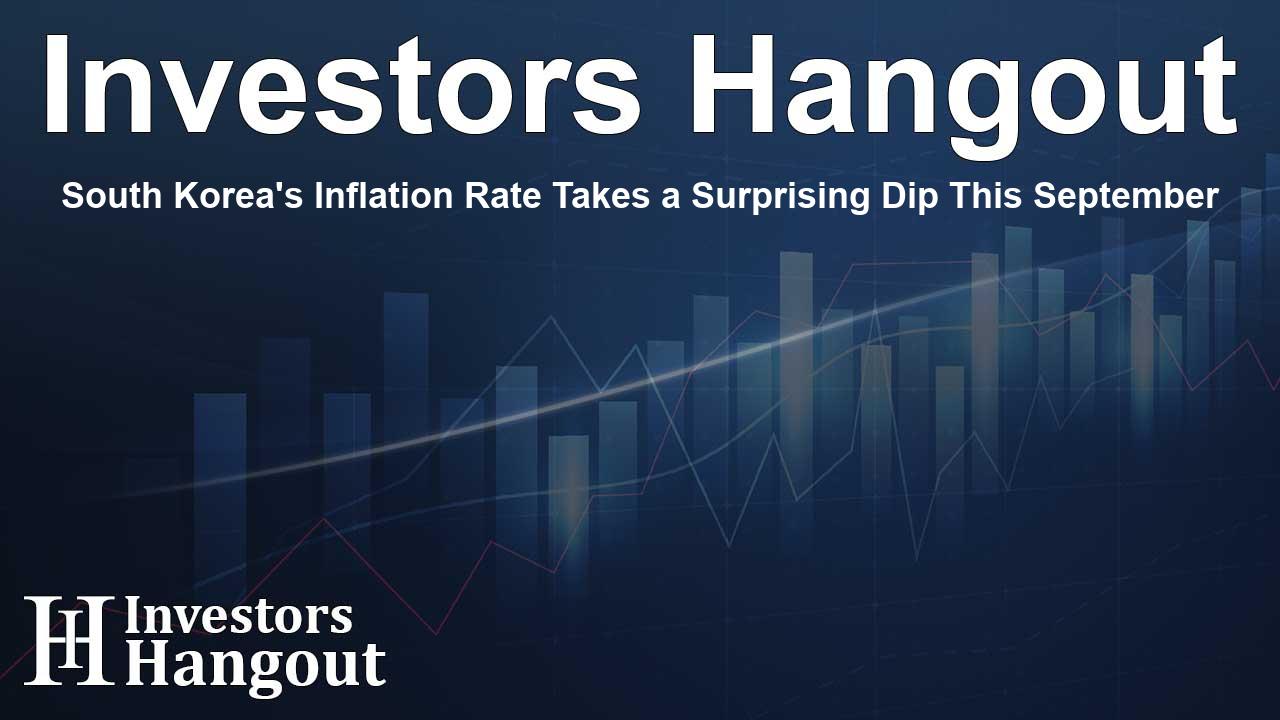South Korea's Inflation Rate Takes a Surprising Dip This September

South Korea's Inflation Rate Drops Significantly
Recently released official data shows that South Korea has experienced a notable decline in consumer inflation as of September. The consumer price index, which measures the average change over time in the prices paid by consumers for goods and services, rose only 1.6% from the previous year. This decline is significant, marking the lowest annual increase since early 2021.
Monthly Changes in the Consumer Price Index
The index also demonstrated a modest increase of 0.1% on a monthly basis, which undershot previous gains of 0.4% observed in August. Economists had anticipated this monthly increase to be around 0.3%, indicating a slower momentum in the inflation rate than expected.
Comparative Analysis with Previous Months
This recent inflation figure is lower than the median increase of 1.9% predicted by economists in a recent Reuters poll. It emphasizes the broader economic context as inflation continues to fluctuate unexpectedly, challenging forecasts that have often leaned towards higher inflation rates.
Insights into Future Economic Trends
Analysts are now observing these trends closely, as lower inflation might influence economic policies and financial markets. The continued cooling of inflation could provide the South Korean government more leeway in terms of monetary policy and economic adjustments.
Potential Impacts on Consumers and Businesses
For consumers, a lower inflation rate may bring some respite, especially for daily essentials and overall purchasing power. Lower inflation typically means that consumers can buy more for their money, which can lead to increased spending and boost overall economic growth.
Market Reactions to Inflation Changes
Markets have responded differently to this dip in inflation. Investors are adjusting their expectations regarding interest rates and monetary policies that could be influenced by the changing inflation landscape. Market confidence can fluctuate based on these measurements as they anticipate future economic performance.
Summary of Current Economic Climate
In summary, South Korea's consumer inflation rate in September reflects a significant cooling trend, which deviates from earlier forecasts. This change highlights a shifting economic landscape that could have far-reaching implications for consumers, businesses, and policymakers alike. With the ongoing adjustments in inflation, economic stakeholders are keen on monitoring future developments to better align their strategies and decisions.
Frequently Asked Questions
What is the current inflation rate in South Korea?
The current consumer inflation rate in South Korea is 1.6% as of September.
How does the September inflation rate compare to previous months?
The inflation rate decreased from 1.9% in August to 1.6% in September.
What was the expected inflation rate for September?
Economists had predicted a 1.9% increase for September's inflation rate.
What could the lower inflation rate mean for consumers?
A lower inflation rate could benefit consumers by allowing them to purchase more with their money, effectively increasing their purchasing power.
How might this affect economic policies in South Korea?
The decrease in inflation might provide the government and economic policymakers more flexibility in terms of monetary policies and economic strategies.
About Investors Hangout
Investors Hangout is a leading online stock forum for financial discussion and learning, offering a wide range of free tools and resources. It draws in traders of all levels, who exchange market knowledge, investigate trading tactics, and keep an eye on industry developments in real time. Featuring financial articles, stock message boards, quotes, charts, company profiles, and live news updates. Through cooperative learning and a wealth of informational resources, it helps users from novices creating their first portfolios to experts honing their techniques. Join Investors Hangout today: https://investorshangout.com/
Disclaimer: The content of this article is solely for general informational purposes only; it does not represent legal, financial, or investment advice. Investors Hangout does not offer financial advice; the author is not a licensed financial advisor. Consult a qualified advisor before making any financial or investment decisions based on this article. The author's interpretation of publicly available data shapes the opinions presented here; as a result, they should not be taken as advice to purchase, sell, or hold any securities mentioned or any other investments. The author does not guarantee the accuracy, completeness, or timeliness of any material, providing it "as is." Information and market conditions may change; past performance is not indicative of future outcomes. If any of the material offered here is inaccurate, please contact us for corrections.